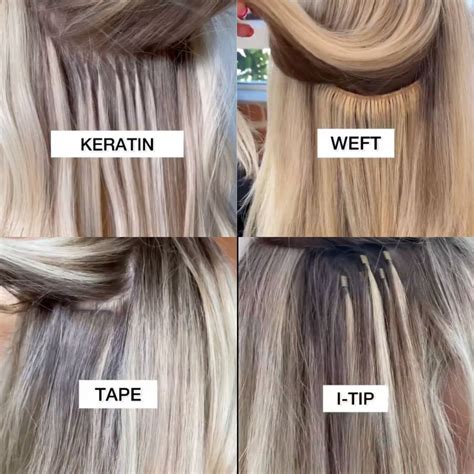Table 1: Types of Hair Extensions
| Type | Attachment Method | Material |
|---|---|---|
| Clip-in | Temporary | Synthetic or human |
| Tape-in | Semi-permanent | Real or synthetic |
| Keratin | Permanent | Real |
| Micro-link | Semi-permanent | Real |
1. Clip-in Extensions: Versatility at Your Fingertips
- What are clip-in extensions?
Clip-in extensions are temporary strands of hair attached to clips that can be fastened into your natural hair like hair clips. - Pros:
- Quick and easy to apply: Take just a few minutes to secure.
- Reusable and versatile: Can be used multiple times and styled as you desire.
- Affordable: Relatively inexpensive compared to other extension types.
- Cons:
- May not be suitable for very thick or thin hair.
- Can cause tension on the scalp with prolonged use.
2. Tape-in Extensions: Seamless and Natural
- What are tape-in extensions?
Tape-in extensions consist of flat, pre-taped strands of hair that are secured to your natural hair using a special adhesive tape. - Pros:
- Seamless: Blends effortlessly with your own hair.
- Semi-permanent: Lasts up to 6-8 weeks with proper care.
- Can add volume and length without damage: The adhesive does not damage your hair like other methods.
- Cons:
- Requires a professional application.
- Can be expensive compared to clip-in extensions.
3. Keratin Extensions: The Gold Standard
- What are keratin extensions?
Keratin extensions are individual strands of real hair that are bonded to your hair using a keratin-based adhesive. - Pros:
- Permanent: Lasts for up to 4-6 months.
- Durable: Resistant to heat and damage.
- Natural and undetectable: Blend seamlessly with your own hair.
- Cons:
- Most expensive extension type.
- Time-consuming and requires a professional application.
- Removal can be challenging and may damage your hair if not done properly.
4. Micro-link Extensions: Invisible and Comfortable
- What are micro-link extensions?
Micro-link extensions are individual strands of real hair that are attached to your natural hair using tiny metal or silicone beads. - Pros:
- Invisible: The beads are nearly undetectable.
- Comfortable and lightweight: No tension on the scalp.
- Semi-permanent: Lasts for up to 2-3 months.
- Cons:
- Requires a professional application.
- Can be more expensive than clip-in extensions.
- May slip out if not installed properly.
Frequently Asked Questions
- Which type of hair extensions is the best?
The best type depends on your individual needs and preferences. Consider factors such as desired length, volume, longevity, and budget. - Can I dye my hair extensions?
Yes, but only if they are made of real hair. Always consult a professional to ensure the dye will not damage the extensions. - How long do hair extensions last?
The lifespan varies by type: clip-in (removable anytime), tape-in (6-8 weeks), keratin (4-6 months), micro-link (2-3 months). - How much do hair extensions cost?
The cost varies widely depending on type, hair quality, length, and salon fees. Expect to pay anywhere from $100-$2,000.
Conclusion
Hair extensions offer versatile and customizable solutions to enhance your hair’s volume, length, and style. Whether you prefer the convenience of clip-ins, the seamlessness of tape-ins, the durability of keratin, or the invisibility of micro-links, there’s an extension type to cater to your unique desires.

